 The Christian Book of Mystical Verse Selected and with an Introduction and Notes by
The Christian Book of Mystical Verse Selected and with an Introduction and Notes by
A. W. TOZER
Start Publishing LLC Copyright 2012 by Start Publishing LLC All rights reserved, including the right to reproduce this book or portions thereof in any form whatsoever. First Start Publishing eBook edition October 2012 Start Publishing is a registered trademark of Start Publishing LLC Manufactured in the United States of America 10 9 8 7 6 5 4 3 2 1 ISBN 978-1-62793-207-3
INTRODUCTION
The purpose of this book is to bring together in one convenient volume some of the best devotional verse the English language affords, and thus to make available to present day Christians a rich spiritual heritage which the greater number of them for various reasons do not now enjoy. I have not hesitated to apply the term mystical to the material I have collected here, though I readily admit that fewer than half a dozen of the men and women who would be called true mystics in the strict classical sense will be found here. Such names as Eckhart, Ruysbroeck, John of the Cross, Teresa, Rolle, Tauler, Hilton, Francis of Assisi, for instance, are not represented in this volume at all.
On the other hand the frequent appearance of such a man as Watts might cause the reader to lift a questioning eyebrow and ask, Is Watts also among the mystics? Well, the answer must be, Of course he is, and so are John Newton and James Montgomery and Reginald Heber and Charles Wesley, as well as many others who might have balked at being called mystics but whose writings, nevertheless, reveal unmistakable traces of purest mysticism and are the better for it. And for that matter the same thing may be said of the inspired writings of such men as Moses and David and Isaiah and Daniel and Paul and John, the works of the latter showing more than traces of the mystical spirit, being indeed charged full with it. As short a time as, say, forty years ago, the words mystic and mystical were altogether unacceptable in evangelical circles. Among the gospel churches the words suggested someone who was emotionally unstable, visionary, and worst of all, unsound theologically. Now there are undoubtedly many persons with a temperamental fondness for the fantastic. These have by nature a strong psychic bent that predisposes them toward the occult; they have also an incredible capacity for self-deception and are ready to accept whatever in the realm of religion is bizarre and prodigious.
Such as these have been sometimes called mysticssomething they most surely are not. The word mystic as it occurs in the title of this book refers to that personal spiritual experience common to the saints of Bible times and well known to multitudes of persons in the post-Biblical era. I refer to the evangelical mystic who has been brought by the gospel into intimate fellowship with the Godhead. His theology is no less and no more than is taught in the Christian Scriptures. He walks the high road of truth where walked of old prophets and apostles, and where down the centuries walked martyrs, reformers, Puritans, evangelists and missionaires of the cross. He differs from the ordinary orthodox Christian only because he experiences his faith down in the depths of his sentient being while the other does not.
He exists in a world of spiritual reality. He is quietly, deeply, and sometimes almost ecstatically aware of the Presence of God in his own nature and in the world around him. His religious experience is something elemental, as old as time and the creation. It is immediate acquaintance with God by union with the Eternal Son. It is to know that which passes knowledge. The hymns and poems found here are mystical in that they are God-oriented; they begin with God, embrace the worshipping soul and return to God again.
And they cover almost the full spectrum of religious feeling: fear, hope, penitence, aspiration, the longing to be holy, yearning after God, gratitude, thanksgiving, pure admiration of the Godhead, love for Christ, worship, praise and adoration. The mood runs from near despair to near ecstasy, and the twin notes of utter sincerity and deepest reverence may be heard throughout. This is a book for the worshiper rather than for the student. It has been carefully and lovingly prepared for those God-enamored persons who, while they feel as deeply as the enraptured poet, yet lack the gift that would enable them to express their feelings adequately. Such will sense a kinship with the gifted souls they find on the pages of this book and will join them as they mount on high to pour out their hymns at heavens gate. In making these selections I have largely followed my own bent, though I have been guided somewhat by a few simple rules.
First, all sentimental verse was excluded, along with everything homey and maudlin. The only healthy emotions are those aroused by great ideas, and even these must be restrained and purified by the Spirit of God or they will spend themselves in weak and sterile rhymes. Of such there is enough in the religious world; I think none will be found in this book. Second, while the compiler is not unfamiliar with the judgment of hymnologists and literary critics on the larger body of English religious verse, that judgment has been set aside and another adopted for this book. For this reason some of the standard classics have been omitted because I felt they would not contribute to my purpose. Conversely, certain poems of admittedly inferior literary rank have been included because I felt that they would.
Third, everything selected for inclusion in this work had to be judged theologically sound. While considerable latitude was allowed, even welcomed, in doctrinal outlook and emphasis, to be accepted every hymn and poem had to meet the test of faithfulness to the Christian Scriptures. Though almost everything here is pure lyric poetry and may easily be sung, yet this book is not intended for use in the public assembly. Had I meant it to be so used a wholly different kind of verse would have been chosen for it and the book would have been another sort of book altogether. Everything here is for use in private devotion. I have had in mind not a congregation but the lone individual.
For this reason I would respectfully urge the one who may come into possession of this book not to read it as he would read another book. Let him try rather to enter into its mood, to capture and be captured by its spirit. How many pages he gets through in a day is of no importance; what one poem or even one single stanza does to him and for him and in him: that is everything. Admittedly much pure gold has been left out of this treasury. The chief reason is lack of space. I have tried to keep the book small enough to be portable, that its possessor may carry it with him and so turn any bus or train or airplane into a sanctuary.
Certainly not all the gold in the world is in this one volume, but what is here is, I believe, true gold of Ophir. I hope many of my fellow Christians will find it to be so. A. W. Tozer
CONTENTS
Adoration of the Godhead Eternal Power
ETERNAL POWER!
Eternal Power, whose high abode Becomes the grandeur of a God: Infinite lengths beyond the bounds Where stars revolve their little rounds: Thee while the first archangel sings, He hides his face behind his wings: And ranks of shining thrones around Fall worshipping, and spread the ground. Lord, what shall earth and ashes do? We would adore our Maker too; From sin and dust to Thee we cry, The Great, the Holy, and the High.
Earth, from afar, hath heard Thy fame, And worms have learnd to lisp Thy Name; But O! the glories of Thy mind Leave all our soaring thoughts behind. God is in heaven, and men below: Be short our tunes; our words be few: A solemn reverence checks our songs, And praise sits silent on our tongues. ISSAC WATTS, 1674-1748
Next page

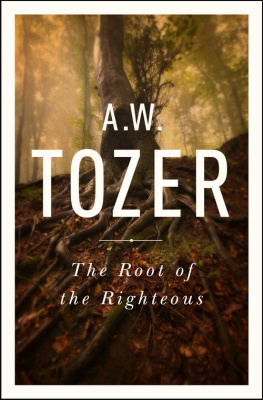
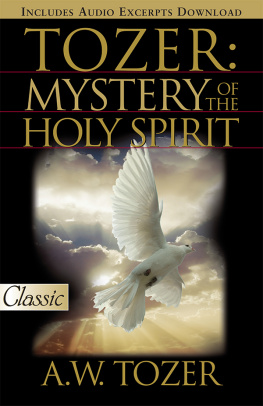
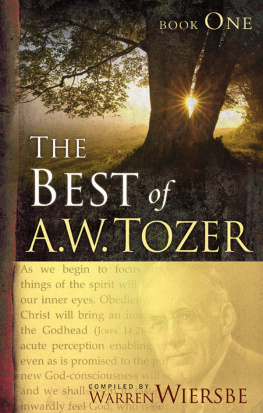
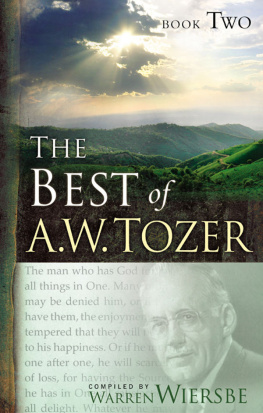
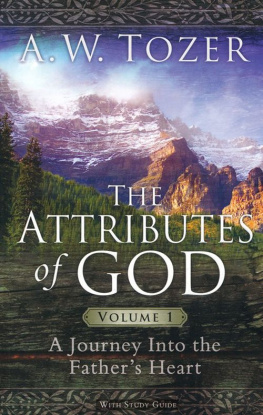
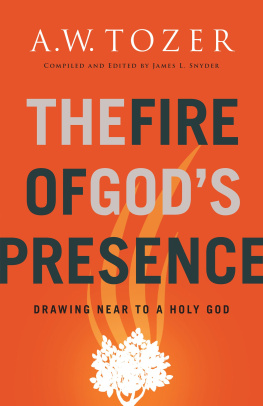
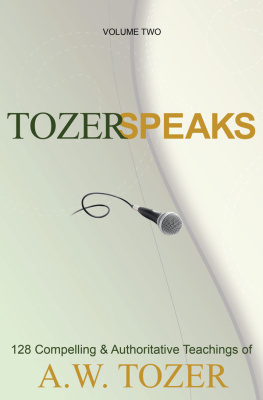
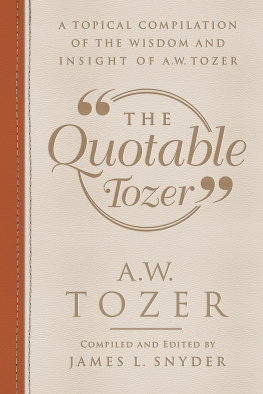
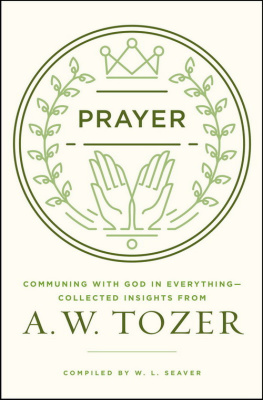
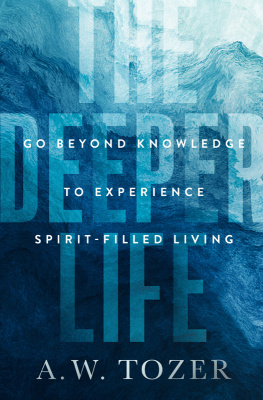
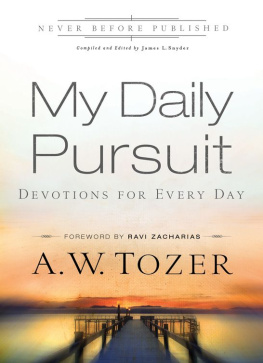
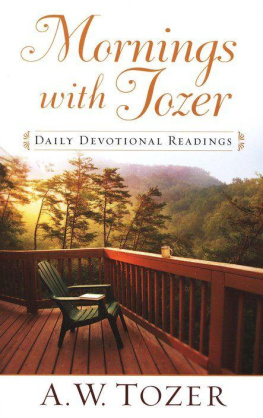
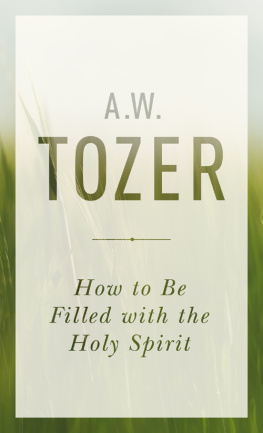
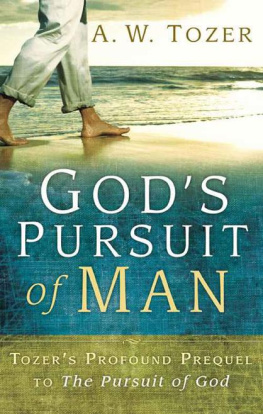
 The Christian Book of Mystical Verse Selected and with an Introduction and Notes by
The Christian Book of Mystical Verse Selected and with an Introduction and Notes by